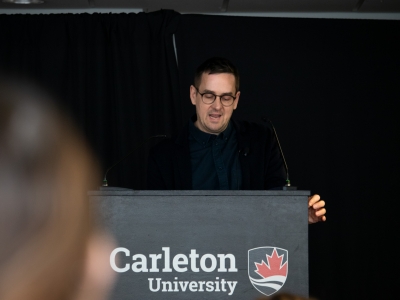Please note: This course was only offered once when we had the scholar in residence with the expertise to teach it. Her stay with us was time limited.
A new course taught by Carleton University’s Public Servant in Residence, Elana Aptowitzer, is aiming to increase the pool of professional speechwriters in Ottawa.
When Elana Aptowitzer was hired to lead a new speechwriting team at the Department of National Defence in 2016, she soon realized that the speechwriting community in government faced some unique circumstances and challenges.
“Very quickly, I discovered it was difficult to identify and hire trained speechwriters in Ottawa—and those in government were siloed,” she explains.

Elana Aptowitzer
Within six months, Aptowitzer launched the Government of Canada’s Speechwriting Community of Practice, which quickly attracted more than 100 speechwriters from departments across the public service. The group maintains an active online dialogue on the public service’s professional networking platform, GCconnex. They also meet a few times a year for professional development and to host talks by former U.S. Presidential and Canadian Prime Ministerial speechwriters.
Despite the success of the community of practice, there is still a demand for many more trained speechwriters, especially as many of the government’s experienced writers are nearing retirement. With this in mind, Aptowitzer thought of offering a speechwriting course at a local university in the hopes of training a new crop of talented and enthusiastic recruits.
“I pitched the idea to my executive leadership and they were characteristically supportive right from the start”, she says. Her Deputy Minister gave her the official go ahead, and Carleton’s Arthur Kroeger College of Public Affairs was happy to host her for the 2019-20 academic year.
Aptowitzer’s residency has been arranged through Interchange Canada, which facilitates exchanges between the private and public sectors to enable the transfer of knowledge and expertise between the two worlds.
The course, called ‘Professional Speechwriting: Pen, Podium, Persuasion and Power’ (IPAF 4800), is currently recruiting undergraduates with fourth-year standing for the Fall term. It will also be offered in the Winter term and Aptowitzer is planning an intensive course for working professionals in the winter, as well.
“This will be a professionally focused, practical course that will not only teach students how to write speeches, but will also give them a sense of what it’s like to be a speechwriter in Canada today,” she says.
“Speechwriting is always exciting because writers are often at the table when decisions are made and policies are set. Then we get to shape the words that bring those decisions and policies to life,” she continued. “Still, there are unique realities to speechwriting here, when compared to the U.S. or Europe.”
For one thing, Canadian government speechwriters rarely know or get to spend much time with the officials for whom they write. In fact, Aptowitzer says that some speechwriters go years without meeting or speaking with their clients.
“Unlike the United States, government speechwriters here tend to be public servants and therefore nonpartisan. So there is a natural and necessary barrier between us and our political clients. That can make it difficult to find interesting anecdotes and nuggets of personal information to include in speeches,” says Aptowitzer, who met with President Obama’s speechwriters in the West Wing of the White House to learn from them and share best practices. “But my team and I took it up as a challenge we could overcome with meticulous research. If our Minister said something publicly, we made sure we got the transcript so we knew exactly what he said and how he said it.”
In the course, Aptowitzer will introduce students to various types of speeches, while ensuring they get comfortable receiving constructive criticism of their work. That’s a key professional skill, she says.
But in addition to imparting those skills, Aptowitzer will also share her passion for speechwriting.
“Speechwriters play a big role in driving the Parliamentary agenda and communicating important policies. Our jobs are key to maintaining public trust in national institutions,” she explains. “But more than that, every so often we get to write a speech that moves citizens emotionally, philosophically, or physically into action for positive change in the world. That’s the magic of it. If I can play even the smallest part in that, I feel like I’ve made a difference.”
More information about IPAF 4800.
Friday, June 7, 2019 in News, Teaching
Share: Twitter, Facebook



